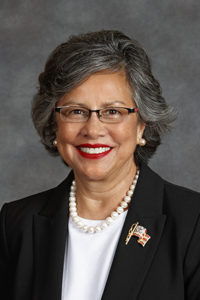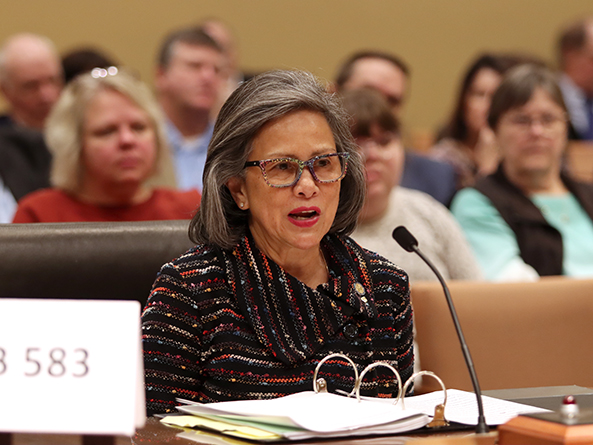Proposal would add per-student aid to school funding system
The state would pay public school districts $1,500 in foundation aid per student each year under a bill heard Feb. 7 by the Education Committee.

In addition to that funding, LB583, introduced by Bellevue Sen. Rita Sanders at the request of Gov. Jim Pillen, would require the state to pay districts special education supplemental aid each year beginning with school fiscal year 2023-24.
The aid would be 80 percent of the difference between a district’s actual expected expenditures for special education and the special education funding it already receives from state and federal sources.
Sanders said the proposal is a first step toward fixing Nebraska’s “inadequate” school funding system, the Tax Equity and Educational Opportunities Support Act. Under LB583, she said, approximately 180 of the state’s roughly 240 school districts would receive additional state aid, and no district would receive less aid than it does currently.
The additional state support would be paid from a new fund proposed under LB681, introduced by Elmwood Sen. Robert Clements at the request of the governor. That bill would require a $1 billion transfer to the fund from the state’s general fund in fiscal year 2023-24 and a $250 million transfer the following year.
Pillen testified in support of LB583, saying it would provide guaranteed state funding to each Nebraska public school student for the first time and address the federal government’s failure to reimburse school districts for their special education expenses at the promised level.
“It is time for the state to step up and fill the gap,” he said.
State budget administrator Lee Will also testified in support, saying the bill would direct an additional $300 million to K-12 school funding annually, a nearly 30 percent increase.
He said foundation aid primarily would benefit districts that do not receive equalization aid, which is state aid intended to cover the difference between a district’s needs and its local resources, such as property taxes. This additional state funding would help those districts reduce their reliance on property taxes, Will said.
Edison McDonald testified in support of the bill on behalf of The Arc of Nebraska. He said it would be a “historic investment” in special education at a time when overworked teachers and staff are unable to properly support students with intellectual and physical disabilities.
Josh Fields, superintendent of Seward Public Schools, testified in support of LB583 on behalf of an organization representing 18 midsize Nebraska school districts. Although the proposed foundation aid would be a net benefit only to unequalized school districts, he said, the additional special education aid would “help all boats rise.”
With the increased state support from LB583, the schools his organization represents could decrease their property tax levies by 5 to 20 cents, Fields said.
Testifying in opposition to the bill was Rebecca Firestone of OpenSky Policy Institute. When combined with a cap on school districts’ revenue growth as proposed under LB589, introduced by Albion Sen. Tom Briese, LB583 could result in some districts losing revenue despite the increased state aid, she said.
Additionally, Firestone said, the bill would not designate a dedicated revenue source for the additional K-12 funding.
Spencer Head testified in opposition to LB583 on behalf of Omaha Public Schools. Although OPS supports the proposed special education aid, he said, foundation aid goes against the principle of equalization within the state’s school funding system.
“LB583 and various other bills over the years that seek to add foundation aid … are simply efforts to reallocate state resources to districts that under current law don’t require additional state resources,” Head said.
The committee took no immediate action on the bill.


